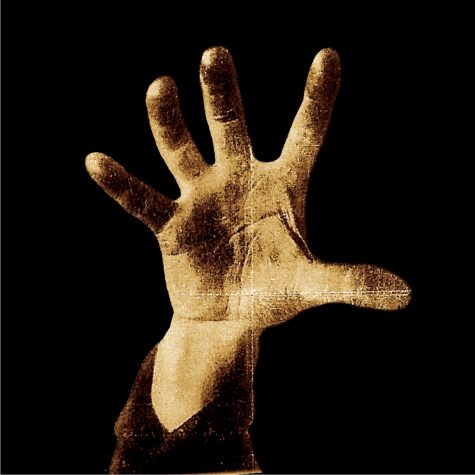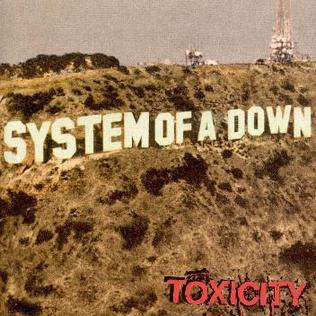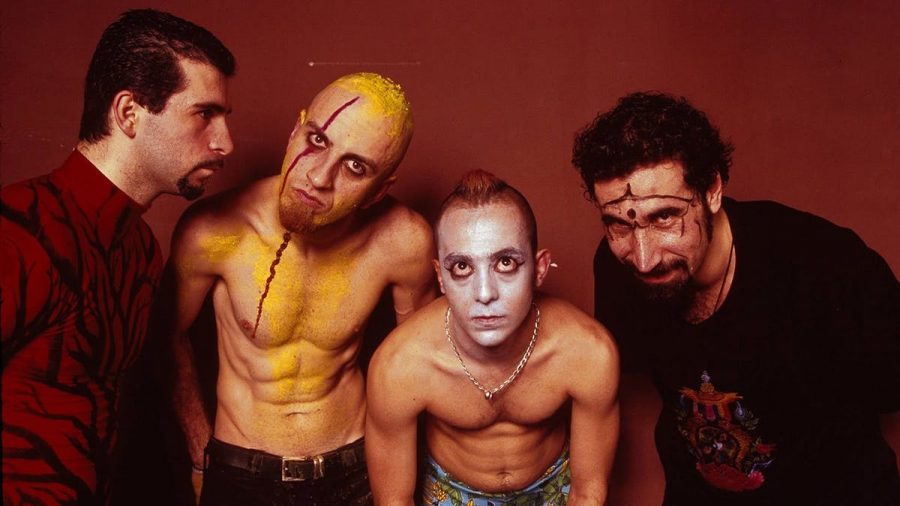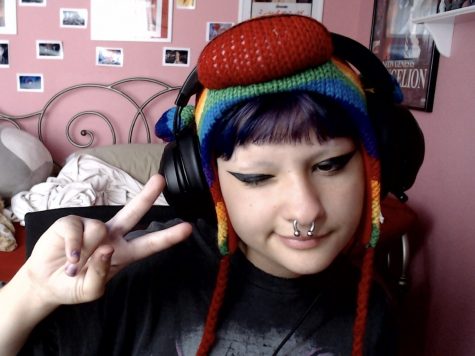Analysis of System of a Down
October 28, 2021
System of a Down is an alternative rock band formed in the 90s in Southern California. They are Armenian-American musicians whose discography is very politically and socially charged, spreading their opinion all over the world. Their music is vastly different than most bands that were debuting during the nu-metal era. While being most well known for their song, Chop Suey off of the album Toxicity, they also have 4 other albums that have had huge impacts. System of a Down, or SOAD, has four members; Serj Tankian (vocals), Daron Malakian (guitar), Shavo Odadjian (bass), and John Dolmayan (drums). The band has split but recently came together after 15 years to release two new songs to fundraise money for Armenians who are suffering in the war against Azerbaijan.
Serj Tankian was born in Lebanon, 1967 and moved to Los Angeles in 1975. Daron Malakian was born in Hollywood, 1975 to parents of Armenian origin. Shavo Odadjian was born in Armenia, 1974, and later moved to Los Angeles to live with his grandmother. John Dolmayan was born in Lebanon in 1973. Tankian, Malakian, and Odadjian all went to the same Armenian American school. They then formed their band in the mid-90s. They signed to American Recordings and were distributed by Colombia.
 Their debut album, self-titled, harbors one of their most popular songs Sugar, an erratic and distinct song loved by many, but also contains songs about addressing genocide, injustice, war, drugs, sex, and other taboo subjects. The album cover is of a hand from an anti-fascist poster by John Heartfield in World War II. Most of the songs on this album are crazy and wacky sounding but possess a deeper meaning. For example, “P.L.U.C.K.”, is the 13th track off this album and addresses the Armenian Genocide. The acronym stands for “Politically Lying Unholy Cowardly Killers” in regards to the Ottoman Empire (Turkey). The Turkish government refuses to recognize the genocide of an estimated 1.5 million Armenians, so by writing multiple songs about this phenomenon, the members of SOAD are trying to raise awareness of this injustice. “War?” is the 8th track and criticizes the whole reason for war: power struggles. In this song, they say that all war is fought behind the reasons of religion which they mask as reasons for “good”. When giving a reason, or excuse to war, no one will question the morality of war when killing innocents, they just blindly accept that it is for war. Peephole, the 10th track is all about drug use. It can be interpreted as being for or against it. It addresses how people get addicted and can’t come clean. They express how important it is to use drugs in a controlled manner, “Don’t ever get stuck in the sky when you’re high”, expresses the importance of not getting addicted. The different colors of the song almost create a divide that represents someone in their high state, and what it’s like to be in reality. Lastly, the album’s most popular song, “Sugar”, is the 3rd track on the album. The style of this song is super insane and deranged. The song doesn’t explicitly have any meaning or message to it, which leaves it up to interpretation for anyone who wishes to try to understand it.
Their debut album, self-titled, harbors one of their most popular songs Sugar, an erratic and distinct song loved by many, but also contains songs about addressing genocide, injustice, war, drugs, sex, and other taboo subjects. The album cover is of a hand from an anti-fascist poster by John Heartfield in World War II. Most of the songs on this album are crazy and wacky sounding but possess a deeper meaning. For example, “P.L.U.C.K.”, is the 13th track off this album and addresses the Armenian Genocide. The acronym stands for “Politically Lying Unholy Cowardly Killers” in regards to the Ottoman Empire (Turkey). The Turkish government refuses to recognize the genocide of an estimated 1.5 million Armenians, so by writing multiple songs about this phenomenon, the members of SOAD are trying to raise awareness of this injustice. “War?” is the 8th track and criticizes the whole reason for war: power struggles. In this song, they say that all war is fought behind the reasons of religion which they mask as reasons for “good”. When giving a reason, or excuse to war, no one will question the morality of war when killing innocents, they just blindly accept that it is for war. Peephole, the 10th track is all about drug use. It can be interpreted as being for or against it. It addresses how people get addicted and can’t come clean. They express how important it is to use drugs in a controlled manner, “Don’t ever get stuck in the sky when you’re high”, expresses the importance of not getting addicted. The different colors of the song almost create a divide that represents someone in their high state, and what it’s like to be in reality. Lastly, the album’s most popular song, “Sugar”, is the 3rd track on the album. The style of this song is super insane and deranged. The song doesn’t explicitly have any meaning or message to it, which leaves it up to interpretation for anyone who wishes to try to understand it.
 Toxicity is SOAD’s second studio album and peaked at number one in the Billboard 200. This album differs from their previous album, with a lot more melodic musicality. There are three top hit songs on this album, “Chop Suey”, “Toxicity”, and “Aerials”. Like the self-titled album, the topics of this album range from mass incarceration, religion, police brutality, drug addiction, the environment, and the CIA.*TW: Topics of SH* “Chop Suey”, the band’s most popular song, is a song about suicide. It depends on your take on the lyrics but it touches on different aspects of understanding suicide and the different perspectives of it. At the same time, it also is questioning the logistics of religion and its morality. “Prison Song” is a song about criticizing the prison-industrial complex in the US, the drug war, and mass incarceration. They address the hypocrisy of the US when incarcerating thousands of Americans (the majority being minorities and poor people) for minor drug offenses, while people in the public eye, like Hollywood, have been known for using these drugs and in even heavier amounts. 1 in 5 people who are incarcerated was locked up for drug offenses in the United States. These incarcerations benefit for-profit prison populations and hurt communities. Another one of the band’s most popular songs is “Toxicity”, a song about Attention-Deficit/Hyperactivity Disorder (ADHD). One lyric, “Looking at life through the eyes of a tire hub” means that with ADHD, life seems as if it is always spinning and is hard to focus on. He talks about how kids today are being given medication in order to treat these symptoms of ADHD, although taking pills to treat these symptoms can also have other side effects and tolls on the bodies and minds of the people taking them (toxicity).
Toxicity is SOAD’s second studio album and peaked at number one in the Billboard 200. This album differs from their previous album, with a lot more melodic musicality. There are three top hit songs on this album, “Chop Suey”, “Toxicity”, and “Aerials”. Like the self-titled album, the topics of this album range from mass incarceration, religion, police brutality, drug addiction, the environment, and the CIA.*TW: Topics of SH* “Chop Suey”, the band’s most popular song, is a song about suicide. It depends on your take on the lyrics but it touches on different aspects of understanding suicide and the different perspectives of it. At the same time, it also is questioning the logistics of religion and its morality. “Prison Song” is a song about criticizing the prison-industrial complex in the US, the drug war, and mass incarceration. They address the hypocrisy of the US when incarcerating thousands of Americans (the majority being minorities and poor people) for minor drug offenses, while people in the public eye, like Hollywood, have been known for using these drugs and in even heavier amounts. 1 in 5 people who are incarcerated was locked up for drug offenses in the United States. These incarcerations benefit for-profit prison populations and hurt communities. Another one of the band’s most popular songs is “Toxicity”, a song about Attention-Deficit/Hyperactivity Disorder (ADHD). One lyric, “Looking at life through the eyes of a tire hub” means that with ADHD, life seems as if it is always spinning and is hard to focus on. He talks about how kids today are being given medication in order to treat these symptoms of ADHD, although taking pills to treat these symptoms can also have other side effects and tolls on the bodies and minds of the people taking them (toxicity).












